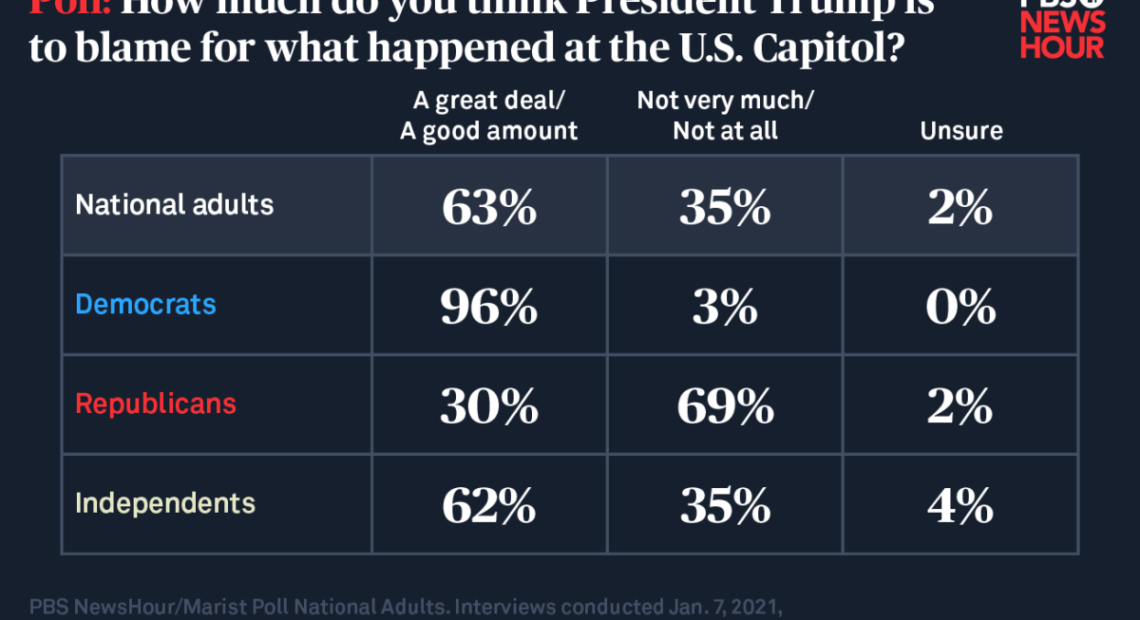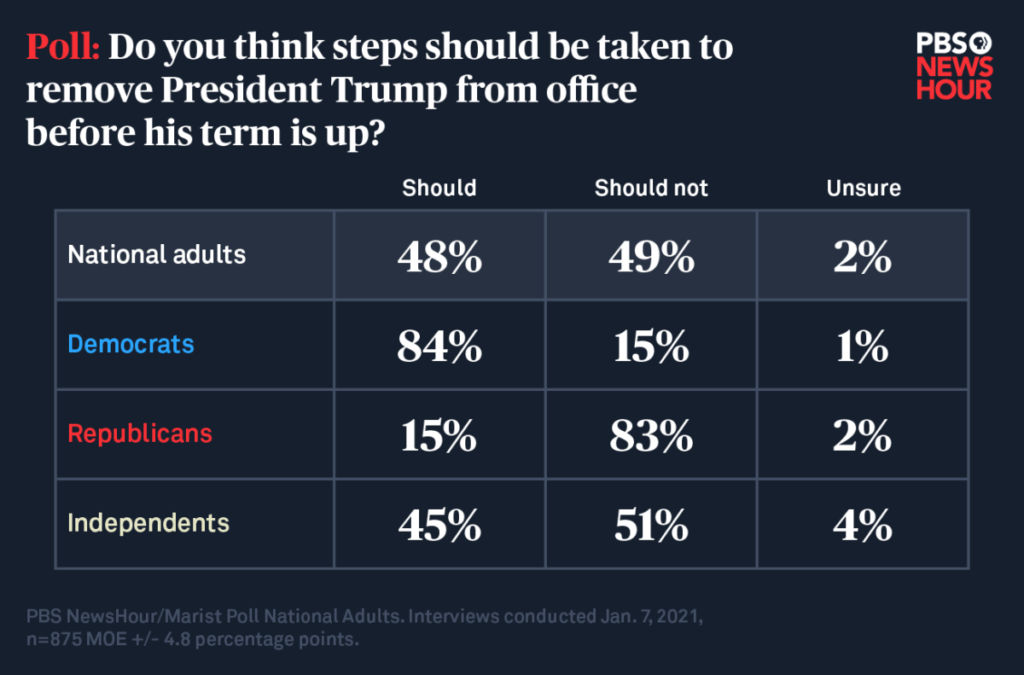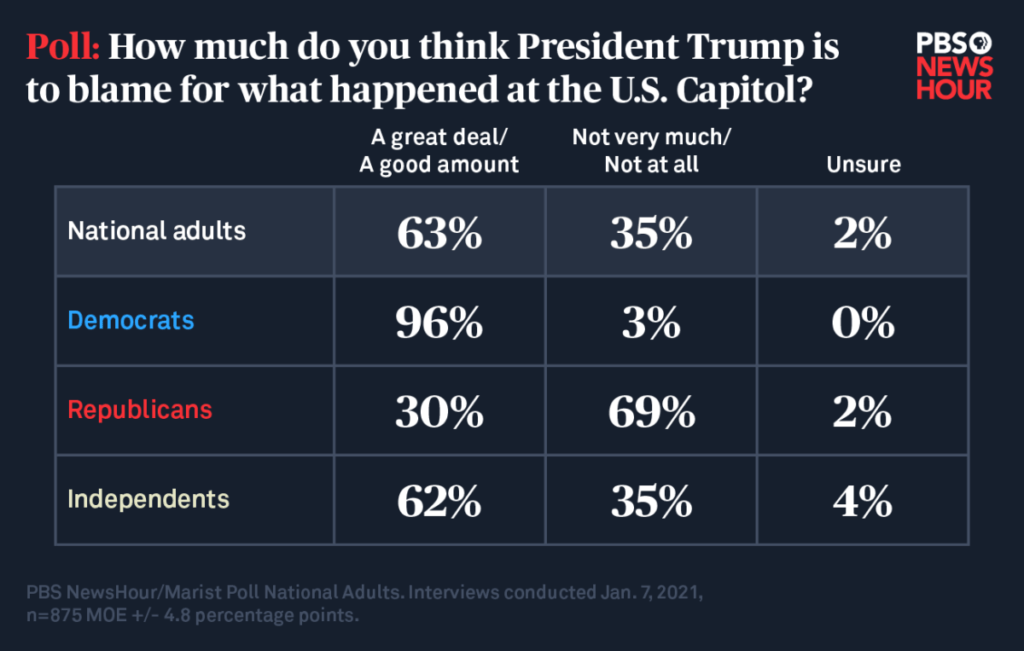According to this latest poll, 35 percent of Americans don’t trust the election results, despite no evidence of widespread interference, including 72 percent of Republicans, signaling little change since December when 34 percent felt the election results weren’t accurate. Roughly two-thirds of Americans believe the election results were accurate, and that Biden is the rightful winner and future president.
Despite the belief among many that the presidential election results were not accurate — the very belief that spurred Trump supporters to gather in the nation’s capital this week — the vast majority of Americans — 88 percent — oppose the actions of those who broke into the U.S. Capitol, according to this latest poll. That includes 96 percent of Democrats, 86 percent of independents and 80 percent of Republicans. However, nearly a fifth of Republicans — 18 percent — were in favor of Trump supporters breaking into the U.S. Capitol, far more than the 3 percent of Democrats and 7 percent of iIndependents who felt the same. Ninety percent of U.S. adults and 100 percent of Democrats say the perpetrators should be prosecuted for the break in.
When the siege began, Capitol police were quickly overwhelmed. Some videos shared on social media showed lone officers up against crowds using shields, metal flagpoles and debris to shatter windows and pry open doors to the Capitol. When law enforcement were able to regain control of the building and remove the trespassers, footage appeared to show them being allowed to leave the building without being detained by police. Outrage over the way the crowd was able to approach and gain access to the building for hours before the situation was contained led to the chief of the Capitol Police and the Senate Sergeant-at-Arms resigning.
A majority of Americans — 56 percent — felt law enforcement were not aggressive enough when confronted with the Trump supporters who broke in. Another 30 percent of Americans said law enforcement’s response was mostly appropriate, including 42 percent of Republicans.
Future for U.S. democracy
This unprecedented moment in the nation’s history punctuates Americans’ pessimism about the effect of political divisions on the country’s future. Eighty-one percent of Americans said the issues that divide the U.S. pose a serious threat to democracy. And a fifth of Americans, including 28 percent of Republicans, 24 percent of independents and 11 percent of Democrats, say U.S. democracy is not likely to survive such discord.
During his presidency, Trump inflamed those conflicts, said Ruth Ben-Ghiat, an American historian and expert on fascism and authoritarian leaders who is a professor at New York University. To sow distrust in the integrity of the U.S. election process, he has tweeted propaganda and used disinformation about voter fraud, Ben-Ghiat said.
Americans live in a time where “conspiracy theories can run rampant,” presidential historian Michael Beschloss said. People still disagree over who shot President John F. Kennedy and raise racist questions about the birthplace of President Barack Obama, including Trump himself, he said, adding that if people believe false claims about widespread voter fraud in the 2020 presidential election, that will pose challenges that Biden must face for years to come.
“We no longer agree on the same set of facts,” Beschloss said. “As this becomes more and more true, it’s a greater and greater challenge to all Americans to elect leaders who can surmount that.”
While claiming widespread voter fraud, the president himself reached out to Georgia Secretary of State Brad Raffensperger, and suggested he wanted election officials to “find” enough votes to keep the state a Republican stronghold during two special Senate runoff elections. Raffensperger resisted the appeal, and Democrats won both seats to regain control of the Senate.
“Americans have had a huge civics lesson on all the things that autocrats can do” to try and stay in power, Ben-Ghiat said.
PBS NewsHour and Marist Poll conducted a survey Jan. 7 that polled 875 U.S. adults (margin of error of 4.8 percentage points) and 831 registered voters (margin of error of 4.9 percentage points).
Copyright 2021 PBS NewsHour. To see more, visit pbs.org/newshour


















